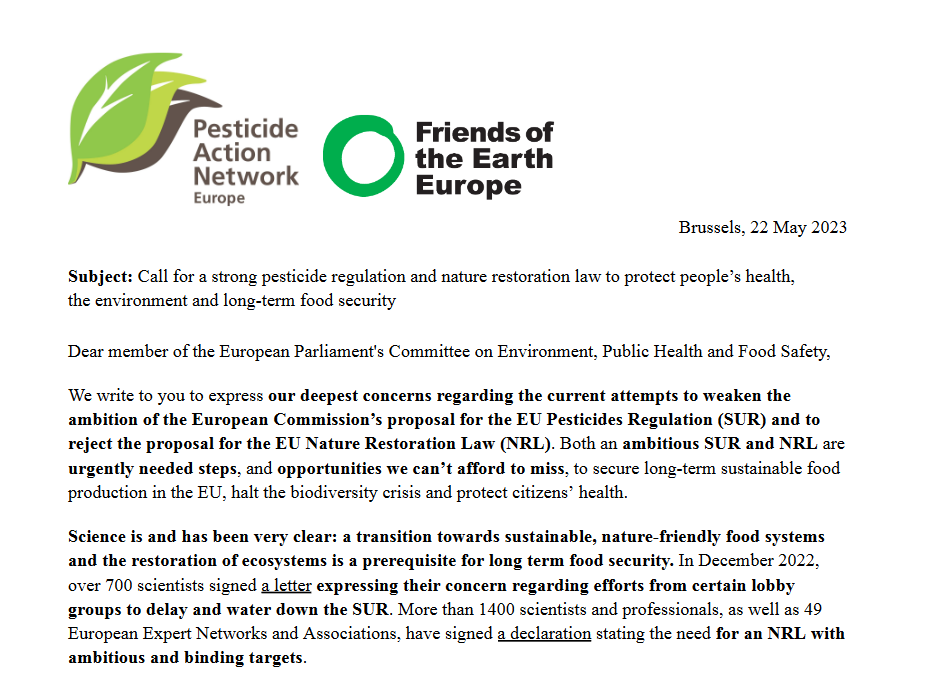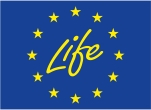
Friends of the Earth Europe and PAN Europe wrote to Members of the European Parliament’s Committee on Environment, Public Health and Food Safety, to call on them to protect people’s health, the environment and long-term food security. Find the letter below or download the PDF above.
Dear members of the European Parliament’s Committee on Environment, Public Health and Food Safety,
We write to you to express our deepest concerns regarding the current attempts to weaken the ambition of the European Commission’s proposal for the EU Pesticides Regulation (SUR) and to reject the proposal for the EU Nature Restoration Law (NRL). Both an ambitious SUR and NRL are urgently needed steps, and opportunities we can’t afford to miss, to secure long-term sustainable food production in the EU, halt the biodiversity crisis and protect citizens’ health.
Science is and has been very clear: a transition towards sustainable, nature-friendly food systems and the restoration of ecosystems is a prerequisite for long term food security. In December 2022, over 700 scientists signed a letter expressing their concern regarding efforts from certain lobby groups to delay and water down the SUR. More than 1400 scientists and professionals, as well as 49 European Expert Networks and Associations, have signed a declaration stating the need for an NRL with ambitious and binding targets.
Both pesticide use and the degradation of biodiversity and ecosystems have severely contributed to the accelerated loss of ecosystem functioning, on which food production fully depends. Ecosystem degradation has made our agricultural systems highly vulnerable to pests and extreme weather events, such as droughts. The FAO and other UN agencies, IPCC, IPBES and other institutions stress that business as usual is not an option if we want to safeguard the future of farmers, biodiversity and ecosystems, while ensuring a healthy, climate-resilient and profitable food production system. Without large-scale nature restoration, we will experience more droughts and floods, as stated by the 2022 IPCC report.
The EEA stated that in the medium- to long-term, excessive pesticide use is likely to negatively affect food security. IPBES has warned that the decline of pollinators is a threat to the availability of both nutritious and healthy food, since about 84% of crops at least partially depend on insect pollination. Not only pollination but also natural pest control has a vital role in food production. While the billions of organisms in soil ecosystems are essential to agricultural production, today 60%-70% of the soils in Europe are degraded. Numbers of farmland birds have decreased by almost 60% over the last 40 years, with a recent study again identifying intensification, in particular pesticides and fertiliser use, as the main pressure for most bird population declines. The disappearance of birds from our agricultural areas is not only a great loss because these areas lose their ‘soundtrack’, but also because of the important roles birds fulfill in ecosystems, such as protecting crops from pests. Restoration of ecosystems and soils is needed to maintain and restore vital pollinator populations, natural pest control, clean water and nutrient availability, the attractiveness of agricultural areas and to foster overall resilience of agricultural systems.
Pesticide use has also a severe impact on the health of farmers and other citizens living in agricultural areas. Farmers, workers, operators, bystanders and all inhabitants of agricultural areas are particularly exposed to pesticides. Pesticide exposure has been linked to increased risks of several illnesses, among more different forms of cancer , cardiovascular diseases, neurological disorders (Parkinson’s and Alzheimer’s disease), fertility issues/infertility, developmental delays in children, cognitive problems and impairments of respiratory health. Pesticides have been shown to drift, leading to contamination and exposure at far distances from the location of application.
The consequences and costs of failing to tackle health impacts, ecosystem degradation and the decline of among more pollinators and other insects, far outweigh any predicted costs related to pesticide reduction and nature restoration. A recent study by the German government’s Environment Agency found that the annual costs of biodiversity loss due to intensive agriculture alone in the country amounted to 50 billion euros – far outstripping the potential economic costs of implementing the needed legislation to protect and restore biodiversity. Another study estimated that the societal costs of pesticide use in France represent more than 10% of the 2017 annual budget of the French Ministry of Agriculture and Food. The EC impact assessment on nature restoration stated that “investment into nature restoration adds €8 to €38 in economic value for every €1 spent, thanks to the ecosystem services that support food security, ecosystem and climate resilience and mitigation, and human health. It also increases nature in our landscapes and daily lives, with demonstrable benefits for health and wellbeing as well as cultural and recreational value”.
Public resources should be used to support farmers in the transition to sustainable systems, and for the restoration of our ecosystems and their functioning (public funds for public goods), and not be allocated to promote and maintain systems that severely harm farmers’ and citizens’ health, our environment and biodiversity, hence threatening long-term food security.
Upholding a strong SUR and NRL is important to maintain the trust of European citizens placed in their representatives in the Council. Therefore, we respectfully ask you to support a strong SUR and NRL. We ask for high ambition in protecting the health of EU citizens and future generations, protecting and restoring biodiversity and ecosystems, safeguarding the future of farmers and ensuring long-term food security.

This publication is co-funded by the European Union. Views and opinions expressed are however those of the author(s) only and do not necessarily reflect those of the European Union or CINEA. Neither the European Union nor the granting authority can be held responsible for them







